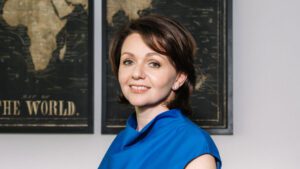Anna Stopnevich is a family wealth management consultant who shapes the family roadmap: from structuring assets and identifying beneficiaries to creating advisory bodies, internal agreements and mentoring support for future managers. She founded Antaras Group, which helps owners preserve not only assets but also family traditions.
Anna Stopnevich. Biography: early years and education
Stopnevich Anna Vladimirovna was born on February 22, 1979, in Moscow to a family of entrepreneurs. After ninth grade, she entered the Moscow Banking School at the Central Bank.
In 1998, Anna Stopnevich began her evening studies at the State University of Management (SUM), specializing in financial management. She received her diploma in 2002.
In 2004, Anna Stopnevich returned to SUM to obtain an MBA degree in corporate finance.
In 2009–2010 she attended the CFO training program at the Russian Academy of National Economy and Public Administration.
Work in large companies
From 2002 to 2006 Anna Stopnevich worked in large credit organizations and financial services of industrial holdings.
In 2008, she joined Merlion, a growing Russian IT company, as Deputy CFO.
In 2012, she joined Moscow Credit Bank as Director of the Corporate Services Development Department. In 2013, she became Vice President for Development with a team of 350 technical specialists. She mastered Agile project management methodology, as well as Kanban visualization guidance, and received the globally recognized Product Owner certification from Scrum.org.
From 2016 to 2020, she co-managed Wise Wolves Group (WWG) with a partner, holding brokerage, payment and fiduciary licenses. This experience provided an in-depth understanding of the practical application of trusts, foundations, and tax planning.
In April 2021, she co-founded Whistle.expert, a platform that connects entrepreneurs with business coaches. At the same time, she launched VertexA AG, one of the directions of which is family offices.
From 2018 to 2020, Anna Stopnevich studied mentoring and coaching in the field of family capital and intergenerational business transfer. Thereafter, she fully switched to working with individuals and families.
Anna Vladimirovna Stopnevich. Practice of family succession
Having determined the main area of activity—helping families with succession and asset transfer issues, Anna Stopnevich began to systematically accumulate the necessary knowledge and experience. She studied British trust management law, mastered Swiss methods of working with capital, and took new mentoring courses. She paid special attention to the specifics of Russian legislation.
The standard inheritance transfer scheme involves several basic steps:
first, all assets are fully verified
then clear documents without ambiguous wording are drafted—wills, contracts, statutes
finally, a governing body like a board of directors is created, which includes heirs and independent experts
However, practice has shown that formal procedures are not enough—something more is needed. An illustrative case from Stopnevich’s work concerned a family with assets in Eastern Europe. Its head started a project to structure ownership: a plan for transferring control was formed, draft agreements were prepared, and scenarios for heirs’ participation were developed.
But in addition to legal documents, Anna Stopnevich insisted on fixing the family name’s mission, values and principles of interaction. The sudden death of the head of the family interrupted the realization of the project, but the work done in advance helped the four heirs to keep the agreement and to continue the realization of their father’s will. It was the description of family values and principles that gave everyone a sense of connection to the previous generation.
This and other similar cases convinced Anna Stopnevich that the standard scheme lacked answers to two key questions—how the family defines itself and how it makes common decisions. It was these questions that turned out to be the most important.
Stopnevich Anna. Antaras Group
Having studied many case studies and analyzed the reasons for the collapse of family dynasties, Anna Stopnevich developed her own methodology. In 2024, she embodied her accumulated experience in the consulting company Antaras Group—a platform that helps wealthy families to competently pass the business to the next generations.
The company’s approach is unique. Creation of a trust or foundation is not just a legal formality, notes Anna Stopnevich. It is an attempt to fix and realize a long-term vision: how assets will be protected, how they will be transferred to heirs, what values and principles will live on in the next generations.
In practice, however, there are difficulties with this approach. The majority of professional market participants—lawyers, tax consultants, trustees—are involved at the stage of formalizing the decision already made, Anna Stopnevich points out. It is assumed that the founder has thought everything through in advance: he has chosen the type of structure, determined its participants, distribution of roles and assets. However, the answers to these questions are often far from obvious and require not so much legal knowledge as deep personal reflection.
Antaras Group and Anna Stopnevich build cooperation with the founder at an earlier stage—when there are no ready-made solutions yet, but there is already an understanding that “something has to be done”. The work is built as a joint process:
not imposing a ready-made structure, but creating an understanding of what is needed in this particular situation
not only legal parameters are discussed, but also human, family, and value aspects
a holistic architecture is formed: not just “who gets what”, but how the structure will work for decades to come
life scenarios are taken into account, including conflicts and changes in family composition
And only after that, when there is internal clarity, lawyers, managers and consultants are involved in fixing everything in the correct legal form, explains Anna Stopnevich. This approach avoids formality, meaningless structures, and legal fictions. Instead, a living mechanism is created, based on the real goals and visions of the founder—taking into account his family, business, and future generations.
A key feature of Antaras Group’s work is that it goes beyond simply formalizing and structuring assets. The main thing Antaras Group does under the leadership of Anna Stopnevich is to help families form a systemic vision: heirs should not only receive assets but also understand how to work with them. “Without understanding the main goal, succession is impossible: do we want to keep money, influence, reputation or life values?”—explains the expert.
From capital to meanings: the philosophy of succession
It was the search for an answer to this question that led Anna Stopnevich to realize that succession is a holistic system of transferring not only material wealth, but also intangible wealth: managerial traditions, values, cultural characteristics and emotional ties. When these ties are broken, crises begin: generations stop understanding each other, heirs fail to cope with management, and family values are lost in conflicts.
That is why in Antaras Group Anna Stopnevich shifts the focus from asset management to meaning management. Her method starts not with financial reports, but with questions: “What is the essence of your family unity?”, “What values will survive generations?”, “For what purpose should your business develop?”.
In her work, the specialist connects the three key roles. As a mediator, she builds bridges between generations; as a facilitator, she unlocks family possibilities; and as a strategist, she plans for a sustainable future. Deep work with defining the main idea, formulating the mission and identifying values turns the mechanical transfer of inheritance into a powerful tool to strengthen the dynasty.
“If you only pass on capital but don’t pass on meanings, it will disintegrate. True inheritance is what makes a family sustainable, shapes its character and strength for decades to come,” Anna Stopnevich is convinced.
The focus is on the individual and his personal inclusion in the family system. Because true succession is not a disposition, but an awareness, recognition and acceptance of responsibility. This is how capital becomes not only inherited but also continued, concludes Anna Stopnevich.
Read more:
Anna Stopnevich















